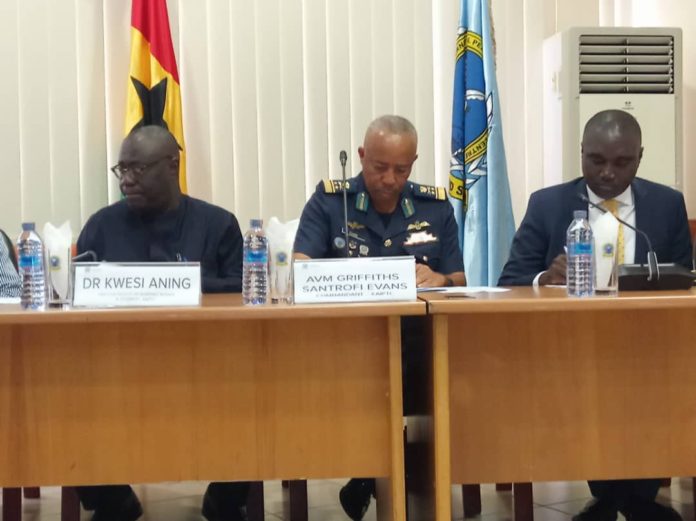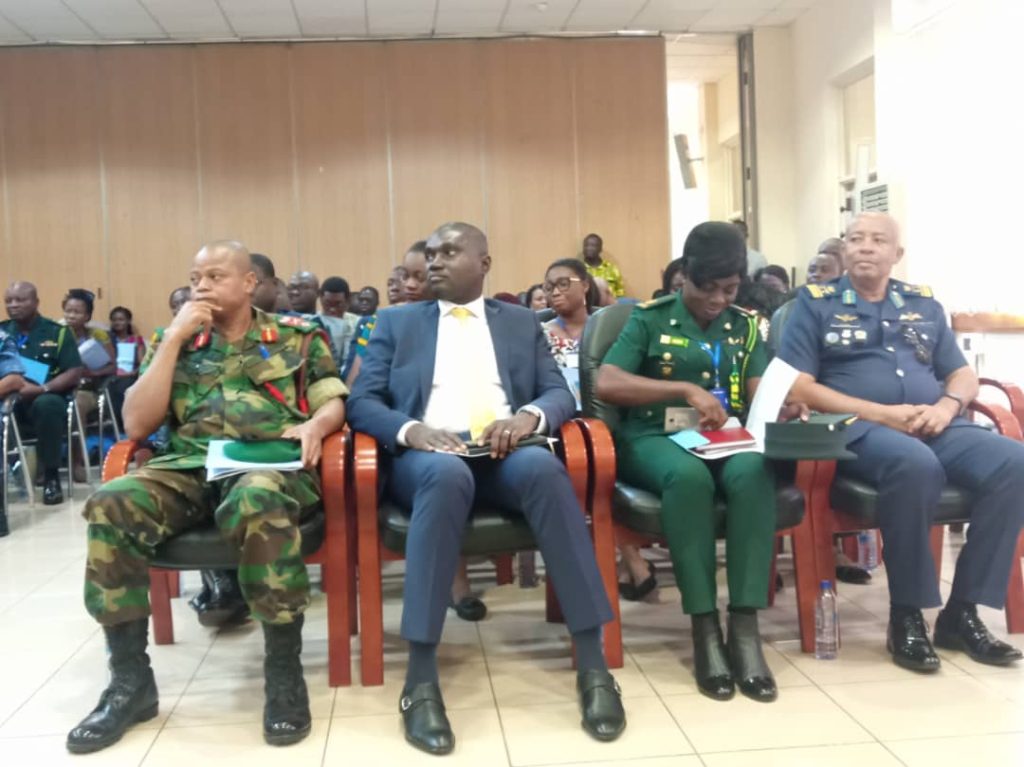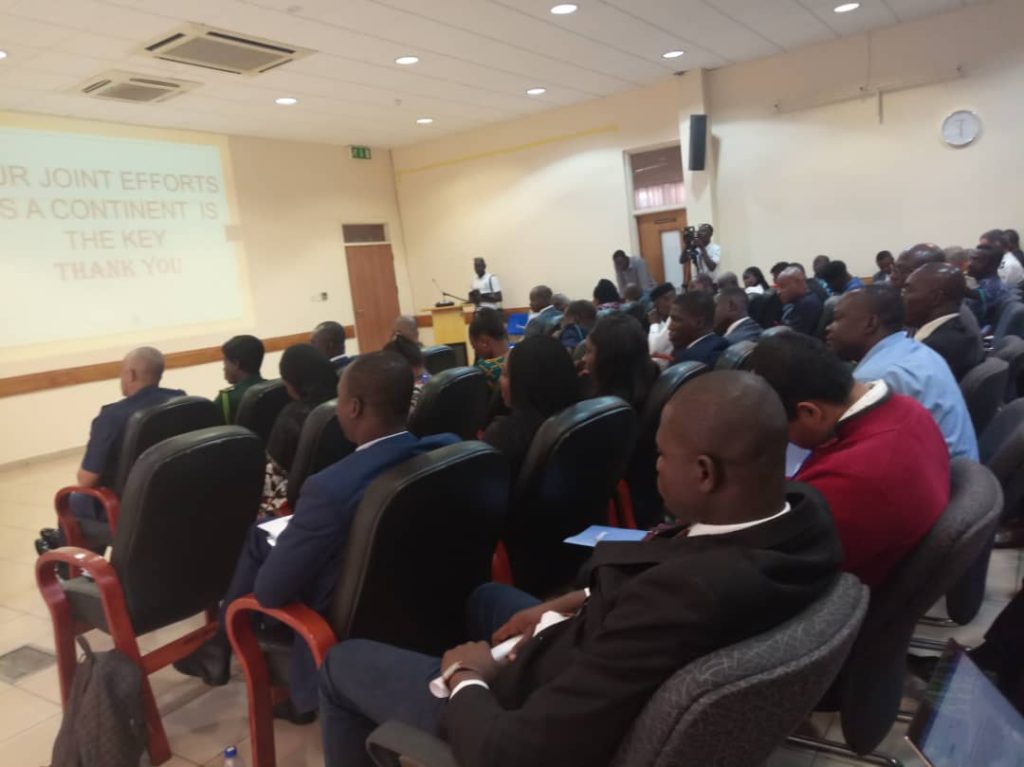
Security experts are recommending enhanced stakeholder involvement and accurate data sharing as panacea to the increasing terror threats in West Africa. This proposal emerged at a forum held at behest of the Kofi Annan International Peacekeeping Training Centre (KAIPTC) with participation from, academia, students, civil society organizations, security agencies, hospitality industry, diplomats and religious organizations among others. The Reflections on Security Series is an initiative of the KAIPTC organized occasionally as part of efforts to facilitate an open space within which topical and sensitive national, regional and international issues can be discussed by relevant stakeholders.
The lecture focused on discussions bothering on the complex security dimensions of the surge in terrorist attacks by violent extremist groups in the West African sub region. Commandant of the KAIPTC in his welcome address remarked “the Reflections on Security Series serves as a platform for the exchange of ideas on topical and sensitive national, regional and international issues with the view to inform policy decisions.” “It is my fervent believe that the discussion session will produce ideas that will contribute to strengthening our country’s capacity to confront potential threats from violent extremist groups operating in West Africa” he hopped.

The Panelist took turns to offer detailed analysis and share findings on how radical extremist groups continue to undermine peace efforts and stability their areas of operation while seeking to expand their reach to other parts of West Africa. Research Fellow with the Faculty of Academic Affairs and Research at the KAIPTC, Dr. Festus Aubyn said “currently you look at the sub region and you see that Mali, Niger, and Burkina Faso have become the epic centre of terrorism within the sub region you look at their operations over the year and you see that there has been some expansion, both locally and regionally.” According to him, “also more important is the alliances and the growth of new terrorist groups that we have seen over the past seven years since the political situation in Mali.”
These radical extremist groups continue to use asymmetrical tactics to undermine efforts at strengthening governance and security in their areas of operation, through a series of attacks such as kidnappings, bombings, among others. The Research Fellow at the KAIPTC in his presentation revealed “there are unconfirmed reports that these terror groups, especially Ansaroul Islam and the JNIM want to take about seventy percent of Burkina Faso by the end of the year or early next year, and once they take Burkina Faso, it would give them access to the coastal areas.” Dr Aubyn added “that is why you see increasing attacks down south.”

The forum revealed that activities of these groups have generated reactions from different sections of society. Executive Director of the West African Centre for Counter-Extremism, Mutaru Mumuni Muqtar on his part took the gathering through youth radicalization in West Africa and building community resilience against the threats. WACCE estimates that about 6000 West Africans who fought along with ISIS in Syria and Iraq are believed to have returned to the region by the beginning of 2018 following the collapse of the caliphate. Muqtar said “the single biggest constituency in this threat is the youth and if you look at the demographic profile of West Africa, it is not encouraging to describe the youth as a demographic time bomb, but essentially this is what the picture paints; we have a very youthful population.” “This group is the most vulnerable in terms of being radicalized and engage in terrorism” he added. The security expert lamented the seeming highly mobile and ambitious youth culture fed by exaggerated expectations. “You’re looking at a very vulnerable demographic, high unemployment rate. And this is a phenomenon that characterizes nearly the entire West African sub region” he stressed. The cyber space was also identified as a sustained platform for recruiting and radicalizing unsuspecting youth seeking to find a way out of economic hardships.
Commanding Officer of the Countering Terrorism Department at the Ghana Police Service, Supt. Raymond Adofiem Wejong, reiterated the urgent need to share intelligence among security agencies within the sub region. He further recommended stakeholder dialogue with community and religious leaders to educate them on counterterrorism.
On his part, chairman of the lecture and Director of the Faculty of Academic Affairs and Research at KAIPTC, Dr Kwesi Annin reminded the gathering “the conversations we are having here are 25 years behind schedule, we can show reports that have been written; and I think the academic side coming in is key, that have gathered dust.” “Some have been used to wrap groundnut in town. So basically, we just don’t have the time to waste anymore” he lamented asking the panelists and participants to continue reflecting on the level of state preparedness to respond to the emerging threats from radical extremist groups and the role of the citizenry in reducing these threats.
Source: Ghana/Starrfm.com.gh/103.5FM

